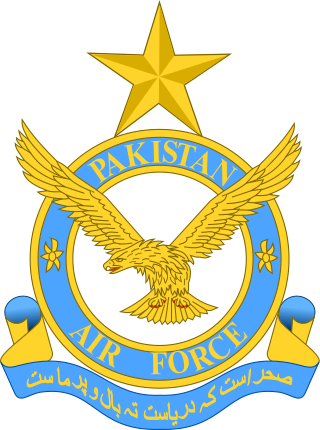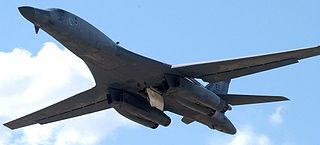Related Research Articles

The Pakistan Air Force (PAF) is the aerial warfare branch of the Pakistan Armed Forces, tasked primarily with the aerial defence of Pakistan, with a secondary role of providing air support to the Pakistan Army and Pakistan Navy when required, and a tertiary role of providing strategic airlift capability to Pakistan. As of 2024, per the International Institute for Strategic Studies, the PAF has more than 70,000 active-duty personnel. PAF is the largest Air Force of the Muslim world in terms of aircraft fleet. Its primary mandate and mission is "to provide, in synergy with other inter-services, the most efficient, assured and cost effective aerial defence of Pakistan." Since its establishment in 1947, the PAF has been involved in various combat operations, providing aerial support to the operations and relief efforts of the Pakistani military. Under Article 243, the Constitution of Pakistan appoints the President of Pakistan as the civilian Commander-in-Chief of the Pakistan Armed Forces. The Chief of the Air Staff (CAS), by statute a four-star air officer, is appointed by the President with the consultation and confirmation needed from the Prime Minister of Pakistan.
Tohir Yo'ldosh (Yunusov Umid), (born Tohir Abdulhalilovich Yuldashev, Russian: Тахир Абдулхалилович Юлдашев (Yunusov Umid), 2 October 1967 – 1 October 2009) was an Uzbek Islamist militant who cofounded the Islamic Movement of Uzbekistan (IMU), an Islamist organization active in Central Asia, with Juma Namangani in August 1998. According to the Defense Intelligence Agency he was a key leader opposing US forces during Operation Anaconda. The United Nations considers the IMU an Islamic terrorist organization.

Balakot is a town in Mansehra district, Khyber Pakhtunkhwa, Pakistan. The town was significantly damaged during the 2005 Kashmir earthquake but was later rebuilt with the assistance of the Government of Pakistan.
On 13 January 2006 the Central Intelligence Agency fired missiles into the Pakistani village of Damadola in the Bajaur tribal area, near the Afghan border, killing at least 18 people. United States officials later admitted that no al-Qaeda leaders perished in the strike and that only local villagers were killed. The attack purportedly targeted Ayman al-Zawahiri, second-in-command of al-Qaeda after Osama bin Laden, who was thought to be in the village.
Rashid Rauf was an alleged Al-Qaeda operative. He was a dual citizen of Britain and Pakistan who was arrested in Bhawalpur, Pakistan in connection with the 2006 transatlantic aircraft plot in August 2006, a day before some arrests were made in Britain. Pakistani Interior Minister Aftab Ahmad Khan Sherpao claimed that "he is an al Qaeda operative with linkages in Afghanistan". He was identified as one of the ringleaders of the alleged plot. In December 2006, the anti-terrorism court in Rawalpindi found no evidence that he had been involved in terrorist activities, and his charges were downgraded to forgery and possession of explosives. A 2022 article offers an assessment of the impact of Operation Overt and refers to Rauf's alleged role
Mustafa Ahmed Muhammad Uthman Abu al-Yazid, better known as Saeed al-Masri or simply al-Masri, was an Egyptian who was alleged to have acted as the financial chief for al-Qaeda. Along with Mahfouz Ould al-Walid and Saif al-Adel, al-Masri was believed to have opposed the September 11 attacks two months prior to their execution. He was killed in a targeted killing drone airstrike in Pakistan on May 21, 2010.

A series of occasional armed skirmishes and firefights have occurred along the Afghanistan–Pakistan border between the Afghan Armed Forces and the Pakistan Armed Forces since 1949. The latest round of hostilities between the two countries began in April 2007. Militants belonging to Tehrik-i-Taliban Pakistan and Jamaat-ul-Ahrar also use Afghanistan's territory to target Pakistani security personnel deployed along the border. The Diplomat says that the presence of terrorists belonging to Tehrik-i-Taliban Pakistan on Taliban Afghanistan and Pakistan soil is the reason for sporadic shelling of Afghanistan's territory by Pakistani security forces.

The following items form a partial timeline of the War in Afghanistan. For events prior to October 7, 2001, see 2001 in Afghanistan.

Qari Hussain Ahmad Mehsud was a top lieutenant in the Tehrik-i-Taliban Pakistan (TTP) and the organizer of the group's suicide bombing squads. He was a cousin of Hakimullah Mehsud.

The Gora Prai airstrike was an airstrike by the United States that resulted in the deaths of 11 paramilitary troops of the Pakistan Army Frontier Corps and 8 Taliban fighters in Pakistan's tribal areas. The attack took place late on June 10, 2008, during clashes between US coalition forces and militants from the Pakistani Taliban.
The Laghman airstrikes refers to two separate airstrikes by the United States, with claimed Pakistani support or compliance,.
Azam Tariq or Rais Khan was a spokesperson for the Tehrik-i-Taliban Pakistan (TTP) and the fourth-highest ranking commander in the group. The TTP chose him as its spokesman after his predecessor, Maulvi Umar, who was detained by Pakistani authorities in August 2009.
Ilyas Kashmiri, also referred to as Maulana Ilyas Kashmiri, Mufti Ilyas Kashmiri and Muhammad Ilyas Kashmiri, was a Pakistani ex-Special Forces Islamist turned terrorist who fought against Indian troops in Kashmir.
Saleh al-Somali, born Abdirizaq Abdi Saleh, was described as being an al-Qaeda leader and the group's head of external operations. He was killed by a missile fired from an unmanned predator drone on 8 December 2009. The missile strike was on a suspect compound in Janikhel village near Pakistan's Federally Administered Tribal Areas, today a part of the Khyber Pakhtunkhwa.
The following lists events that happened during 2015 in Pakistan.
The 2019 Balakot airstrike was a bombing raid conducted by Indian warplanes on 26 February 2019 in Balakot, Pakistan, against an alleged training camp of the terrorist group Jaish-e-Mohammed. Open source satellite imagery revealed that no targets of consequence were hit. The following day, Pakistan shot down an Indian warplane and took its pilot, Abhinandan Varthaman, prisoner. Indian anti-aircraft fire accidentally downed an Indian helicopter killing six airmen on board and one civilian on the ground, their deaths receiving little or no coverage in the Indian media, and remaining officially unacknowledged until seven months later. India claimed it had downed a Pakistani F-16 fighter jet. Defence and military analysts found India's evidence to be circumstantial, its claim discredited by the absence of the required US Department of Defense announcement about the loss, and a leak by department officials of the satisfactory enumeration of these aircraft in Pakistan. The airstrike was used by India's ruling party to bolster its patriotic appeal in the general elections of April 2019.

The 2019 India–Pakistan border skirmishes were a series of armed clashes consisting of cross-border airstrikes and exchanges of gunfire between India and Pakistan across the de facto border in the disputed Kashmir region, which is subject to extensive territorial claims by both countries.
On 27 February 2019, the Pakistan Air Force (PAF) conducted six airstrikes at multiple locations in Indian-administered Jammu and Kashmir (J&K). The airstrikes were part of the PAF military operation codenamed Operation Swift Retort and were conducted in retaliation to the Indian Air Force (IAF) airstrike in Balakot just a day before on 26 February.
On 16 April 2022, the Pakistani military conducted predawn airstrikes on multiple targets in Afghanistan's Khost and Kunar provinces. Afghan officials said the attacks killed at least 47 civilians and injured 23 others. Initial reports described the attacks as either rocket strikes or aerial strikes carried out by a number of aircraft of the Pakistan Air Force, and Afghan officials claimed the operation was carried out by Pakistani military helicopters and jets. Pakistani officials initially denied Pakistan carried out the airstrikes, but Pakistani security officials later claimed the airstrikes involved drone strikes from inside Pakistani airspace, and that no aircraft were deployed. Some reports said the Pakistani airstrikes also targeted parts of Paktika Province.
Shultan District is a district in Kunar Province, Afghanistan.
References
- ↑ Pir Zubair Shah (February 15, 2009). "U.S. Airstrike Kills 30 in Pakistan". The New York Times.